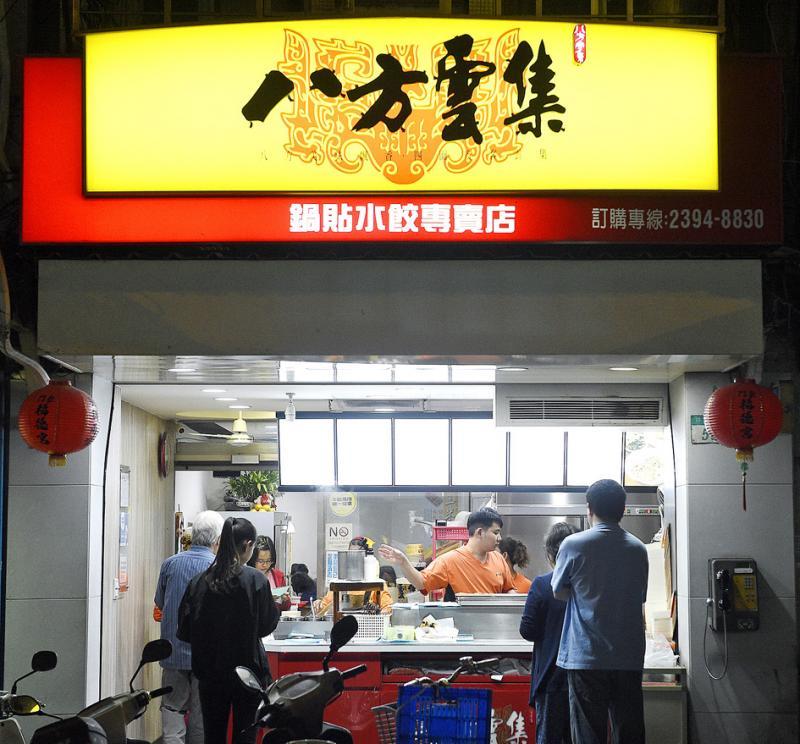Dumpling restaurant chain Bafang Yunji International Co (八方雲集) is to introduce measures to stop losses at unprofitable outlets if they fail to improve next quarter, the company said on Wednesday.
Bafang Yunji also runs pork rice restaurant chain Liang She Han (梁社漢排骨), boxed meal restaurant chain Bai Fung Bento (百芳池上便當) and Bafang Noodles (八方台式麵屋) in Taiwan and China.
The company said it is considering shutting down coffee shop chain Dante Coffee and Foods Co (丹堤咖啡), which it acquired in 2020, and other outlets that incur losses.

Photo: Chen Chih-chu, Taipei Times
The COVID-19 pandemic affected Dante, especially during a level 3 COVID-19 alert last year and a prolonged outbreak of the disease this year, and operations remain disappointing after adjustments, Bafang Yunji told an investors’ conference.
DANTE CLOSURE?
“It is possible that we, after conducting a full review of affiliated businesses, choose to close Dante outlets and call the investment a failure,” the company said, adding that transformation efforts proved unsuccessful.
Takeout services at Dante generated less than 5 percent of the company’s overall revenue, rendering the chain a heavy financial drag, it said.
There are 41 Dante outlets across Taiwan — 18 franchised outlets and 23 directly owned stores, corporate data showed.
The closure plan would extend to unprofitable dumpling outlets in China, where strict COVID-19 controls are hurting sales without a solution in sight, the company said.
It might be better to exit the market to curb losses, the company said, adding that it would re-evaluate investment opportunities after the pandemic eases further.
Bafang Yunji declined to comment on whether it is planning to sell the Dante brand.
However, it said that it intends to expand its operation in overseas markets, including by opening new dumpling outlets in the US.
Revenue at the firm’s local dumpling restaurants grew more than 10 percent in the first seven months of the year, it said.
Bafang Yunji share gained 1.9 percent to NT$160.5 in Taipei trading yesterday, Taiwan Stock Exchange data showed.

EARLY TALKS: Measures under consideration include convincing allies to match US curbs, further restricting exports of AI chips or GPUs, and blocking Chinese investments US President Donald Trump’s administration is sketching out tougher versions of US semiconductor curbs and pressuring key allies to escalate their restrictions on China’s chip industry, an early indication the new US president plans to expand efforts that began under former US president Joe Biden to limit Beijing’s technological prowess. Trump officials recently met with their Japanese and Dutch counterparts about restricting Tokyo Electron Ltd and ASML Holding NV engineers from maintaining semiconductor gear in China, people familiar with the matter said. The aim, which was also a priority for Biden, is to see key allies match China curbs the US

The popular Taiwan Semiconductor Manufacturing Co (TSMC, 台積電) arbitrage trade might soon see a change in dynamics that could affect the trading of the US listing versus the local one. And for anyone who wants to monetize the elevated premium, Goldman Sachs Group Inc highlights potential trades. A note from the bank’s sales desk published on Friday said that demand for TSMC’s Taipei-traded stock could rise as Taiwan’s regulator is considering an amendment to local exchange-traded funds’ (ETFs) ownership. The changes, which could come in the first half of this year, could push up the current 30 percent single-stock weight limit

PROTECTION: The investigation, which takes aim at exporters such as Canada, Germany and Brazil, came days after Trump unveiled tariff hikes on steel and aluminum products US President Donald Trump on Saturday ordered a probe into potential tariffs on lumber imports — a move threatening to stoke trade tensions — while also pushing for a domestic supply boost. Trump signed an executive order instructing US Secretary of Commerce Howard Lutnick to begin an investigation “to determine the effects on the national security of imports of timber, lumber and their derivative products.” The study might result in new tariffs being imposed, which would pile on top of existing levies. The investigation takes aim at exporters like Canada, Germany and Brazil, with White House officials earlier accusing these economies of

Teleperformance SE, the largest call-center operator in the world, is rolling out an artificial intelligence (AI) system that softens English-speaking Indian workers’ accents in real time in a move the company claims would make them more understandable. The technology, called accent translation, coupled with background noise cancelation, is being deployed in call centers in India, where workers provide customer support to some of Teleperformance’s international clients. The company provides outsourced customer support and content moderation to global companies including Apple Inc, ByteDance Ltd’s (字節跳動) TikTok and Samsung Electronics Co Ltd. “When you have an Indian agent on the line, sometimes it’s hard